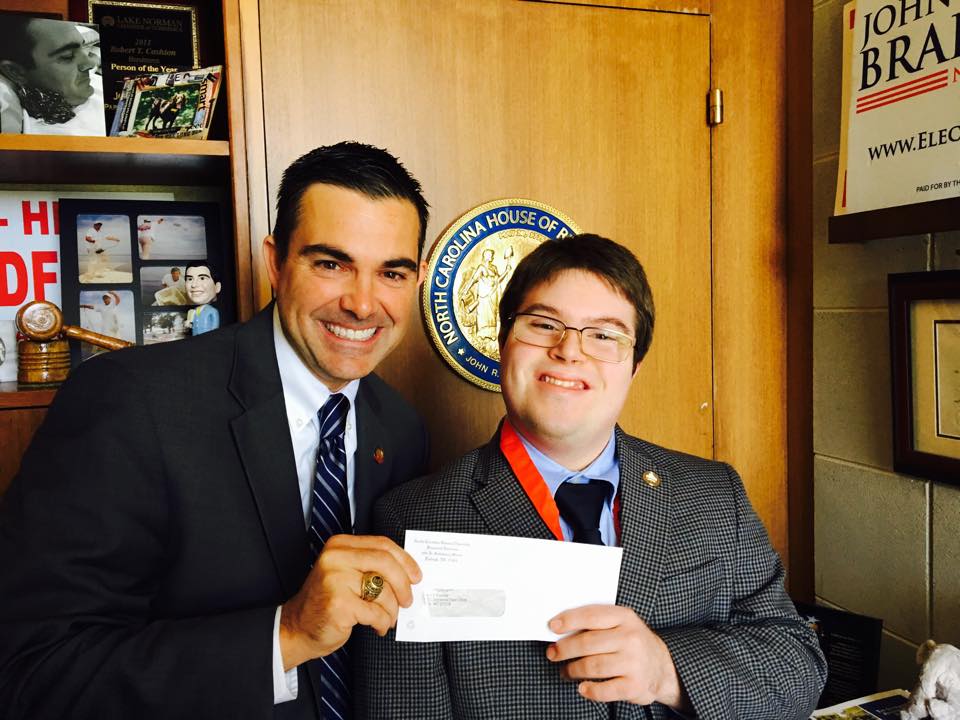
NC Rep John Bradford and his legislative assistant, Paul Kocher
Some political consultants say NC Rep. John R. Bradford III is unbeatable this fall—there is not an official Democratic opponent—but people are watching what happens with Jane Campbell, a Davidson Democrat who was mobilized by the HB2 debacle. She will run as an independent, having gained enough signatures to get on the November ballot
HB2, of course, is the bathroom-gender identity mess that resulted in PayPal choosing not to open an operations center in Charlotte. Campbell is a retired Naval officer who has mounted a petition drive to get her name on the November ballot. Bradford is a former Cornelius Town Commissioner. He and his wife Shea have four children.
Republicans have a tough row to hoe in light of not just HB2, but I-77. Bradford is one of the standard-bearers of the younger Republican party and a leader in the anti-toll battle. With an outgoing personality, a quick grin, street cred among the anti-toll forces and $50,000 in his campaign war chest, he is the man to beat. (If Campbell gains enough signatures, Cornelius Today will interview her in an upcoming edition.)
Cornelius Today sat down with Bradford in June, soon after a press conference in Raleigh where business leaders like John Hettwer, of Payroll Plus, and Bill Russell, CEO of the Lake Norman Chamber, stood alongside NC Sen. Jeff Tarte to underline their opposition to the NCDOT-Cintra contract. HB954, legislation that would cancel the contract, was co-sponsored by Bradford. At press time it was unclear whether it would make it onto the Senate floor, despite the overwhelmingly favorable vote in the House of Representatives.
Q. Congratulations on your success with HB954 in the House. Is it time for rules to be reformed?
Bradford: I am proud to be one of the three primary bill sponsors of HB954. It was a piece of legislation that, I believe, many people thought would never pass the scrutiny of a 120-member House body. It just didn’t pass but it passed with a strong 80-27 bipartisan vote count. That said, this didn’t happen magically. There are so many people that made it possible. To start, Rep. Jeter and Rep. Hagar were the bill’s other two primary sponsors and we worked very well together to garner support from our colleagues. Sen. Tarte and Sen. Curtis have been helpful, too. The multiple and unanimous resolutions asking for contract termination from Cornelius, Davidson, Huntersville, Mecklenburg County and the Lake Norman Chamber of Commerce were very helpful. The unwavering support from local elected officials was critically important. The passionate citizens—they know who they are—and volunteers of the various advocacy groups such as Widen I-77, Exit 28 Ridiculousness and I77BusinessPlan were most helpful in maintaining and raising awareness throughout the region and State. Every bill must be considered and pass both chambers; the House and Senate. This is the way the legislature has worked since the founding of our great state. I believe the rules that need to be changed are contract delegation authority as well as the way a local MPO (transportation planning organization) vote is calculated. For contract authority delegation I believe any State contract greater than $250M should be signed, not just reviewed, by the Attorney General and then signed by the Governor. For this specific contract it was supposedly reviewed by the Attorney General (very poorly reviewed, I might add) but not signed. Then the contract was sent back to the NCDOT and signed by the former Secretary of the NCDOT, Tony Tata. That process just seems wrong to me and gives too much delegation authority to an individual department. In regards to the local MPO, the awarded votes are based on population which means small towns, like ours, really have an insignificant vote. In the case of our MPO, Charlotte has approximately 46 percent of the awarded votes so basically any small town is at the mercy of Charlotte’s vote.
Q. What’s next around the toll plan? Back in February, NCDOT asked for input from the towns on how the Cintra contract should be amended. Of course, the towns responded, but they have not heard back from the NCDOT.
Bradford: I remain hopeful that the Senate will take up HB954. As session continues and we approach July, though, the chances that the Senate will consider the bill are rapidly diminishing. Without legislative support to terminate the contract the options we have are extremely limited and, ultimately, governed by the terms and conditions of the executed contact. We will be in a position to rely heavily on the NCDOT to work with the P3 vendor to make whatever improvements they deem feasible.
Q. Is compromise possible on HB2 at this point? I believe PayPal will announce soon in another state.
Bradford: Compromise is always possible as long as reasonable people work together. My understanding is there was some expressed interest by some members of the Charlotte City Council to rescind their ordinance as a good faith gesture because a few members finally realized they exceeded their legal authority to pass it in the first place. Unfortunately, they decided not to take a vote because of political pressure from the Charlotte Mayor and outside special interest groups. It seems they prefer the business fallout and negative economic impact on their own City rather than trying to compromise. I remain very open to compromise with a priority of ensuring the safety of women and girls in public accommodations.
Q. Does the notion of Lake Norman County have any legs?
Bradford: Perhaps. My No. 1 focus in the short session has been around terminating the toll road contract and the passage of HB954. I’m open to exploring this issue more in the long session with input from all the stakeholders. This isn’t something that will happen overnight and we need to know all the pros and cons before making final decisions.
Q. What kind of calendar(s) do you use? How do you manage your flow of information? How many emails do you get a day?
Bradford: As a representative I have one legislative assistant, Anita. She is incredibly organized and keeps me on track. We share a calendar so she can make real-time changes. I also have access to a company calendar and a family calendar, too. I put everything on the calendar including notes that will remind me of what each meeting is about. I have multiple email accounts to help keep work, government and my personal emails separate. On average I receive over 200 legitimate emails a day.
Q. When you’re in session, when are you home?
Bradford: Most folks don’t really know our legislative schedules. I am away from home four days every single week while we are in session. I leave Monday around mid-morning and I don’t get home until Thursday evening, hopefully, in time to eat dinner with the family. It’s very demanding and, understandably, this schedule wouldn’t work for just any family. My family supports me wholeheartedly which means the world to me.
Q. When you’re not in session, what’s your government workload like?
Bradford: Even when we are not in session we are appointed to serve on interim legislative committees. I serve on three of these interim committees which, in my case, meet on different weeks. This requires me to be in Raleigh at least two days a week except on the third week when none of the committees meet. Every day emails and phone calls still need to be returned. I also meet with constituents very regularly. It’s a very much a full-time gig but I love serving the good folks in District 98.
Q. Your intern is awesome! How do you think you might apply your knowledge of differently abled adults?
Bradford: Paul is my first legislative intern as a representative. He’s an amazing young man. I believe everyone deserves an opportunity. I had this idea to hire an intern with Down Syndrome and asked the Speaker for approval. He approved it without hesitation so I called the Triangle Down Syndrome Network explaining my idea. They were very excited about the opportunity and quickly introduced me to Paul’s family as a candidate. I interviewed them, they interviewed me and the rest is history. In fact, Paul is the first individual with Down Syndrome to work as a legislative intern at the NCGA. Working with Paul has been refreshing. He is quick to trust and forgive. He is honest and pure in every word he speaks. Paul has done more for me than I could ever do for him. It’s turned into a real friendship and a work relationship that I truly cherish.





